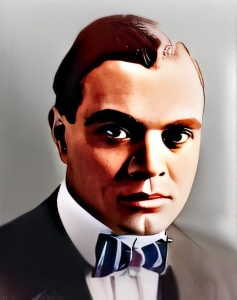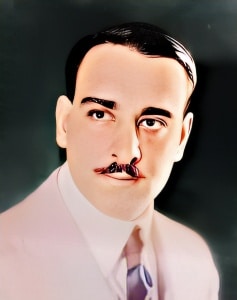 Noble Johnson, a pioneering African American actor and filmmaker, was born on April 18, 1881, in Marshall, Missouri.
Noble Johnson, a pioneering African American actor and filmmaker, was born on April 18, 1881, in Marshall, Missouri.
His life and career are celebrated for breaking barriers and making significant contributions to the early years of American cinema. Johnson’s journey in the entertainment industry was marked by versatility, talent, and a dedication to challenging racial stereotypes.
Johnson began his career on the stage, performing in minstrel shows and circuses, which were common venues for African American entertainers during that era. However, he soon transitioned to acting and film production, driven by a desire to overcome the racial stereotypes that dominated early Hollywood.
In 1916, Johnson co-founded the Lincoln Motion Picture Company, one of the earliest film production companies owned and operated by African Americans. The company aimed to produce films that portrayed African Americans in a positive and dignified light, countering the negative stereotypes that were prevalent in mainstream cinema at the time.
Noble Johnson’s acting career flourished during the silent film era. His imposing physical presence and versatility as an actor made him a sought-after character actor in a wide range of roles. He was known for his ability to portray both heroes and villains, showcasing his range and depth as a performer.
One of his notable early roles was in the 1915 silent film “ The Birth of a Nation,” directed by D.W. Griffith. Johnson played several roles in the film, including a Union soldier and a blacksmith. Despite the controversial content and portrayal of African Americans in the film, Johnson’s performance stood out.
Noble Johnson also contributed to the emerging genre of horror films. In the 1932 classic “Island of Lost Souls,” he portrayed the Sayer of the Law, a memorable character in this adaptation of H.G. Wells’ novel “The Island of Dr. Moreau.” His performance added depth to the film’s eerie atmosphere.
In 1916, Johnson co-founded the Noble and George Johnson Film Company, later renamed the Lincoln Motion Picture Company, with his brother George Perry Johnson. This pioneering company was one of the first to produce “race films” — motion pictures with all-black casts, primarily for black audiences. Their goal was to counter the negative racial stereotypes perpetuated by mainstream cinema and provide more authentic portrayals of African Americans. The Lincoln Motion Picture Company produced a series of short films, such as “The Realization of a Negro’s Ambition” (1916), and full-length feature films like “By Right of Birth” (1921).
While the company faced financial challenges and struggled to compete with larger studios, the films produced by Noble Johnson and his brother played a crucial role in challenging racial stereotypes and offering African American audiences more dignified portrayals on screen.
Noble Johnson continued his acting career in both silent and sound films. He appeared in a wide variety of roles, from the mysterious and menacing to the kind and wise. His dedication to his craft and his willingness to take on diverse characters demonstrated his acting skill.
Noble Johnson’s career spanned a period of significant change in the film industry, from the silent era to the early sound films. He contributed to the evolving representation of African Americans in cinema and paved the way for future generations of black actors and filmmakers.
He passed away on January 9, 1978, in Yucaipa, California, leaving behind a legacy of pioneering work in cinema. Noble Johnson’s contributions to early Hollywood, his efforts to challenge racial stereotypes, and his success as a character actor are remembered as significant milestones in the history of American cinema. His work serves as a testament to the importance of diverse representation in the entertainment industry and the impact of talented individuals who strive to make a difference.
Loading live eBay listings...




